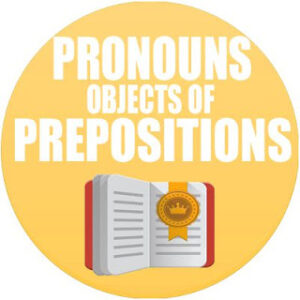
What are Spanish prepositional pronouns?
Learn how to use Spanish Prepositional Pronouns. A pronoun is a word that is used instead of the name of a person or thing.
When the pronoun acts as the object of a preposition, a different set of pronouns is used.
Subject – Obj. Prep. Pronouns
Yo (I) – mí
Tú (You)(Informal) – ti
Él/Ella(He/She) – él ,ella
Usted (You)(Formal) – usted
Nosotros(as)(We) – nosotros/as
Vosotros(as)(You)(Informal) – vosotros/as
Ustedes(You)(Formal) – ustedes
Ellos(as)(They) – ellos/asNote: Only “mí” and “ti” are different from the subject pronouns. Use this second set of pronouns to replace the noun that comes immediately after a preposition.
La profesora habla de mí. – My teacher talks about me.
Tú hablas con ellos. – You talk to them.
Roberto trajo unas flores para ella. – Robert brought some flowers for her.
Note: Whenever “mí” follows the preposition “con”, the two words combine to form “conmigo”.
e.g.
Mi padre viene conmigo – My father comes with me
Mi gato está aquí conmigo – My cat is here with me
Note: Whenever “ti” follows the preposition “con”, the two words combine to form “contigo”.
e.g.
Mi padre va contigo – My father goes with you
Mi gato está allí contigo – My cat is there with you
1- Whenever you want to say “with him, with her, with you (formal), with them, with you-all (formal)” there are two possibilities. If the pronoun is referring to the subject of the sentence, use “consigo”.
e.g.
Pronoun does refer to the subject
Ella llevó los libros consigo – She took the bookswith her(self).
¿Por qué no lleva un libro consigo? – Why don’t you take a book with your(self)(formal)?
2- If the pronoun does not refer to the subject of the sentence, use “con + the appropriate pronoun”.
e.g.
Pronoun does not refer to the subject
Ellas viven con él. – They live with him.
Yo quiero hacer ejercicios con usted – I want to do exercises with you(formal)
There are six special prepositions that are followed by subject pronouns rather than object pronouns.
e.g.
Esto queda entre tú y yo. – This is between me and you
Todos vamos a la fiesta, incluso yo. – We all go to the party, even me
Según tú, ellos ya lo saben. – According to you, they already know
Salvo los frijoles, ya todo está cocinado – Exceptfor the beans, everything is cooked
Compré todo, menos la lechuga – I bought everything, except the lettuce
Leave a Reply
You must be logged in to post a comment.